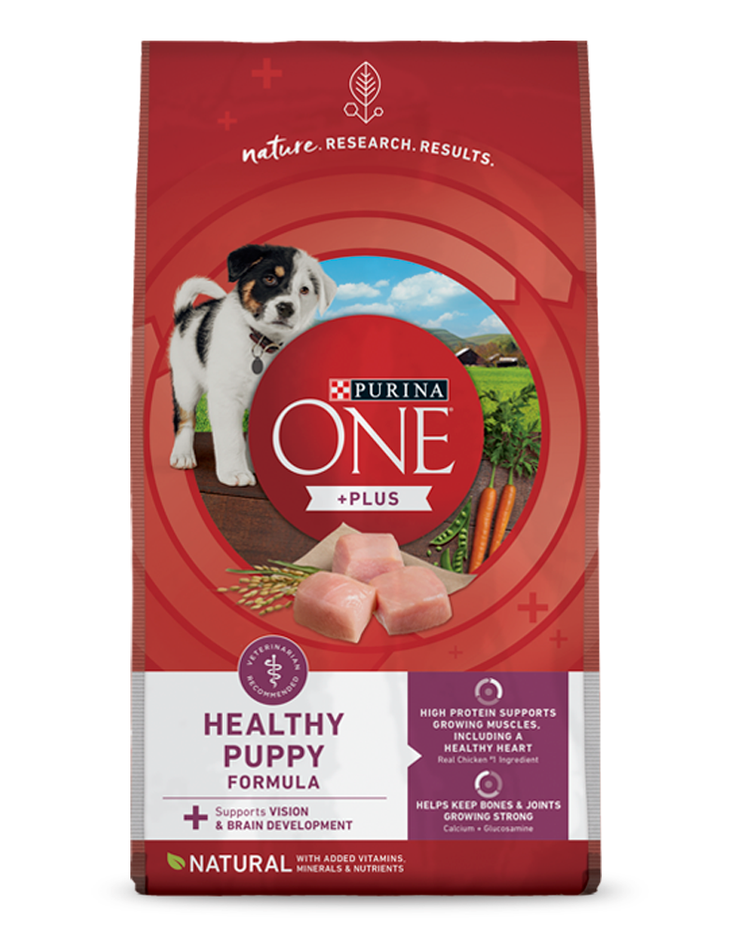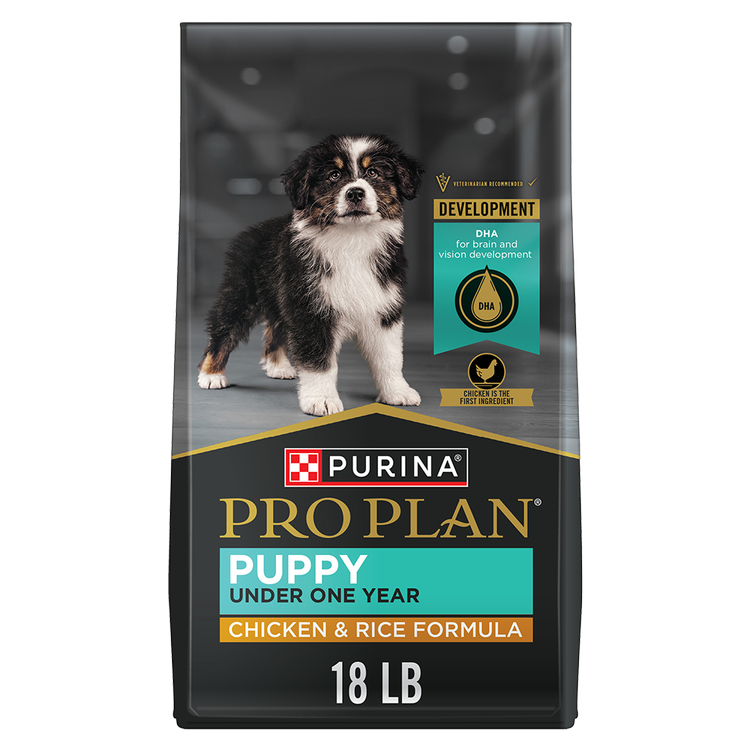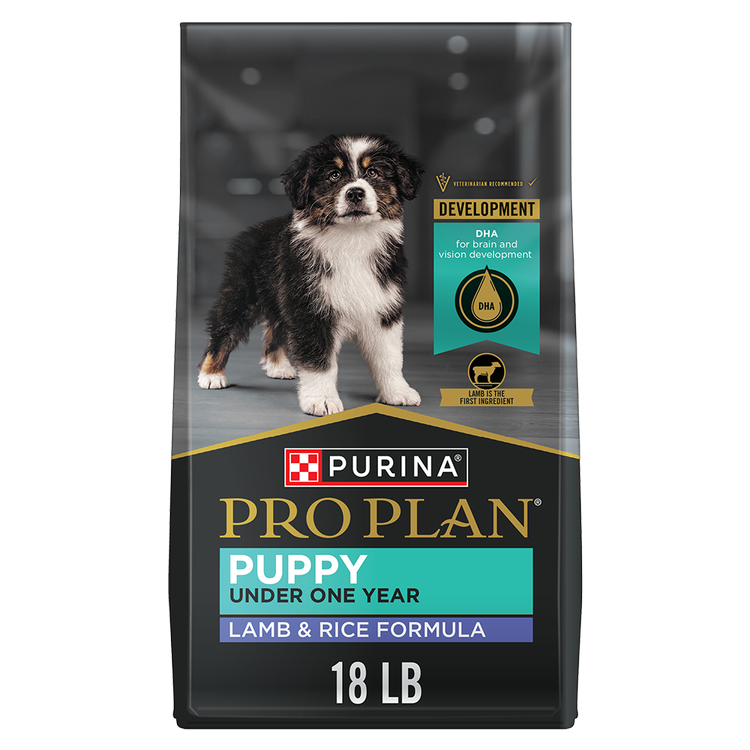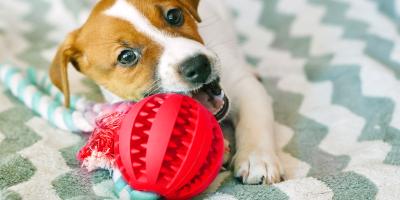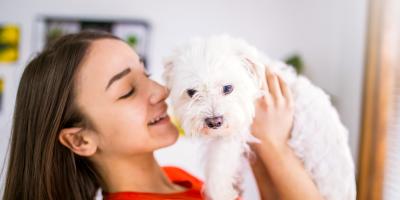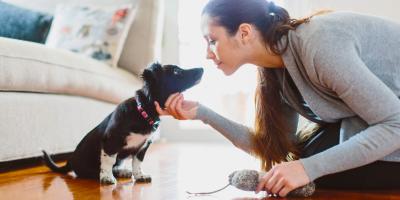The First Week With a Puppy: What to Expect Day and Night

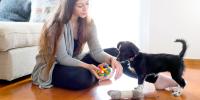
You’re bringing home a new puppy, and everyone in the house is understandably excited. While you can’t wait to welcome your new baby home, remember that it will take a bit of time before your home feels like their home. Especially in your first days home with a puppy, your home will feel like a strange, new place—one they will need to get used to. Here are some new puppy tips to help your precious young family member adjust.
Before Bringing Your Puppy Home
Before bringing a puppy home for the first time, there are some important things you can do to prepare:
- An essential step in preparing for a new puppy is stocking up on the essentials. What do you need to get for a new puppy? The main things you need are a quality puppy food, food and water bowls, a leash and collar with an ID tag, a crate, toys and treats. Our New Puppy Checklist will give you everything your puppy will need to get settled. Planning so you have all the supplies on hand can allow extra time for bonding when you bring your puppy home.
- Potty training should begin the moment you bring your puppy home, so reading up on some tips and tricks before your puppy arrives can help set you both up for success.
- Choosing a name for your puppy and using it consistently are vital to puppy training. Before your puppy comes home, try to choose a name and make sure everyone in the house is in agreement on using it.
- So that everyone knows what to expect with a new puppy, come up with a list of house rules and make sure everyone living in your house agrees to abide by them. Consistency is critical for successful puppy training, and your puppy will learn more easily if everyone in the house is teaching them the same things. When deciding on house rules, remember that behaviors people might find charming in a puppy, such as chewing on fingers or jumping up on guests, may not be welcome in an adult dog. So plan accordingly.
Bringing Your Puppy Home in the Car
The first day with your puppy will start with bringing puppy home in a car from the shelter or breeder. This might be a new experience for your puppy, so take things slowly and introduce them to your car gradually.
To keep your puppy safe during the journey home, put them in a crate or use a harness to secure them to a car safety belt. For additional security, and additional comfort for your puppy, bring a friend or family member to ride with them.
Arriving at Home With Your New Puppy
Making the transition to your family starts with what to do when you bring a puppy home. Remember, while you’re arriving at the home you know and love, your puppy doesn’t understand yet that this is their home, too. Right now, it’s a strange, new place—one they need time to adjust to.
With this in mind, here are some steps to help you know what to do when you first get a puppy:
- The excitement of a car ride to a new place can be overly stimulating for your new puppy. When you arrive home, the first thing you should do is bring your puppy to the outdoor area where you would like them to go potty. Let them sniff around and praise them if they go! Positive praise when they do the right things is one of the best training strategies for your puppy.
- To avoid overwhelming your puppy, limit first-day introductions to family members (including pets) only. Keep the introductions calm and give your puppy time to get used to everyone.
- If you are introducing your puppy to another household pet, have a family member or friend go into your home first to ensure that pet is calm. Then, bring your puppy in and carefully monitor the introduction. If you are introducing your puppy to another dog, a backyard, which can be a more neutral space than a home, can be a good place to do this. Leash your resident dog and have a family member or friend hold that leash while you hold your puppy’s leash. This way you can control their proximity during the introduction. To lessen any territorial inclinations, if everything is going well, bring the two dogs inside together. Sometimes, bringing the puppy in before the older dog can be helpful. Be vigilant about items your resident dog might feel ownership of, such as food bowls, toys and beds, so that your puppy can learn what belongs to whom, and your resident dog can feel secure that their “things” are not at risk.
- After initial introductions, your puppy will likely be tired. Giving them some quiet time in their crate will allow them to rest in a safe space without distractions.
Puppy’s First Day at Home
Your first day with puppy will be overwhelming for them, to say the least. Everything they had come to know in their short life has changed, and during this monumental adjustment period, it’s important to know not only what to expect when bringing home a puppy, but also how to comfort a new puppy. Here are some things to remember:
- Right now, you are the person your puppy knows best. So, plan your schedule so that you can be with your pup for these essential first few days of adjustment.
- Ask the shelter or breeder if you can take a blanket, toy or other item that your puppy has spent time with when you bring them home, so they can have the security of a familiar scent in the midst of their new surroundings.
- Puppies are curious, so give your puppy some time to explore their new home. Show them around the places where they will spend their time, and allow them to take in the sights, sounds and scents. Remember that some things that are familiar to you might be scary for your puppy. So be patient, and ready to reassure them if needed, so they feel safe and gain confidence.
- Puppies start teething at around 12 weeks of age. They also learn about their environment by putting things in their mouths. If your puppy tries to chew on shoes or furniture, redirect them by giving them a toy instead, and praising them when they chew on the toy. If you discover that your puppy has chewed something they shouldn’t have after the fact, don’t scold them. Because puppies live in the moment, they won’t be able to understand that you’re scolding them for something they did in the past. If you do catch them in the act, give them a firm “No,” and redirect them with a toy or game, followed by positive praise when they’ve been successfully redirected.
- Keep things low key and give your puppy space to process the avalanche of new impressions they are taking in. Rather than smothering them with affection and overwhelming them with play and activity, give them time to get used to everything. If your puppy becomes overstimulated, a soothing cuddle or some quiet time in their crate are possible solutions to how to calm a puppy down.
- Watch how your puppy interacts with their new world and use this time to get to know their unique behaviors. Also, use this time to start introducing training—so only for positive behaviors and to discourage negative ones—such as chewing or jumping.
- Developing a schedule for potty training begins on day one. Consistency is the name of the game.
- Start by showing your puppy their potty spot and use a consistent phrase like “go potty” to connect what they should do with what you’re asking them to do. Let them sniff around and get familiar with the area, and if they go potty, praise them or offer a treat (or both!) to help reinforce that behavior in the future. Taking your puppy out to go potty right after mealtimes and before and after naptime can help reduce the chance of accidents in the house.
- Establishing consistent schedules, especially for feeding, is essential to successful potty training. That also starts on your puppy’s first day home. Feed your puppy a quality puppy food—to ease the transition to a new home, bring home some of the food they have been eating at the shelter or breeder. Feed according to the package directions. If your puppy is not eating or drinking first day home, try placing their food and water dishes in an area that feels secure and free of distractions so they can focus on eating and drinking. If they continue to refuse food and water, call your veterinarian. Also, be sure your puppy’s water dish is accessible at all times, and make sure they know where it is.
- While this is an exciting time for everyone in the household, you will likely notice your puppy on first day home sleeping a lot. Puppies need a LOT of sleep—as many as 20 hours a day! They can go from running and playing to falling asleep in seconds. So be sure to give them the opportunity to get the rest they need.
Puppy’s First Night at Home
Your first night with puppy can be stressful for your new furry family member. However, there are some things you can do to get your puppy sleep training off to a good start, and to make this adjustment easier:
- Where should a puppy sleep at night? The question of should puppies sleep in a crate is one that many new puppy parents ask. Experts recommend crate training a puppy at night, and when you have to be away from home, and that training starts on your puppies’ first night home. When dogs are nervous, the shelter of a small, den-like space, like a crate, can provide security. Adding a dog bed, blankets and a favorite toy can make the crate a more welcoming and comfortable space for your puppy to snuggle in. A crate should feel like a safe place for your puppy. To make the crating experience more positive, entice your puppy with a special treat that they only receive when they enter the crate. For alternatives to crate training, ask your shelter, breeder or veterinarian for tips or the contact information for a trainer.
- Another tip for how to get a puppy to sleep through the night is to start establishing regular schedules for feeding and potty breaks. Consistency in these schedules is the key to establishing a puppy sleep schedule that allows everyone in the house to get regular rest. Puppies under 14 to 18 weeks old should get three meals a day—at breakfast, around lunchtime, and at dinnertime. Meals for puppies over 18 weeks old can be decreased to twice a day—at breakfast and dinner. We recommend your puppy get their dinner at around 5 p.m., about four hours before bedtime. Make sure you take your puppy out to go potty right before bedtime.
- To help your puppy work off some excess energy, engage them in playtime about an hour before bedtime.
- If you have a puppy crying at night because they are very young and newly weaned, a hot water bottle wrapped in a towel with a wind-up clock that ticks (like a heartbeat) can help simulate some of the familiar warmth and sounds from sleeping with their mother and litter. This can help make the first night with your puppy easier for you both.
Puppy’s First Week at Home
The first week of having a puppy is a time of continued adjustment for everyone in the household. To help things go more smoothly, here are some puppy tips for the first week:
- Continue to reinforce a consistent routine by feeding your puppy at the same times each day and in the same location. Sticking to a feeding schedule helps them learn what to expect and can also help you anticipate their need to go potty.
- Take your puppy outside regularly, based on your feeding schedule. During your first week home with puppy, help them get used to their leash by taking them for short walks around your yard or wherever you have space. Avoid socializing with other dogs in public places until they have had their vaccinations.
- Your first week with puppy schedule should include some alone time for your puppy. To help them work through any initial separation anxiety, start by taking them out to go potty before putting them in their crate with a special treat. Then leave the house, returning after a few minutes. Initially your puppy may bark and whine, but as you practice and build up the amount of time they are alone, they will learn that you’ll come back. Some puppies, and even adult dogs, find their family’s absence difficult to cope with. If your dog is showing signs of stress, read more about puppy separation anxiety and how you can help your dog feel more comfortable for those times when you’re not around.
- It’s also never too early to start obedience training. Potty training is important as mentioned above, but you also want to begin teaching them some basic commands like “sit,” “down,” and “stay.” Be patient and encouraging during your first week of puppy training to make this a positive, regular experience your puppy with look forward to.
- You will want to take your puppy to see your veterinarian within the first week for an overall checkup. They may need some vaccinations and a parasite check. Also, if your puppy is not microchipped, make sure you get this done right away. This is a great opportunity for your puppy to experience riding in a car and meeting and interacting with new people.
- Your veterinarian will mostly likely encourage you to play with your puppy’s ears and feet as well as establish a consistent dental health routine. All these activities will help you and your puppy in the long run, especially if medical conditions arise.
- In your first week of owning a puppy, you may also want to introduce your new family member to extended family and friends. This can be a great socializing experience, but try not to overwhelm your puppy with too many visitors at once. Allowing your puppy to meet children of all ages will help them develop into a well-rounded dog that loves people of all ages and sizes. Once your veterinarian gives the green light, your first week with new puppy schedule can include socializing your puppy with other dogs, as well. Socialization and training are essential in helping your puppy become a well-mannered dog.
By knowing what to expect when you get a puppy, planning for your puppy and taking care to help them get properly settled, you’ll give them the best chance for success and happiness in your home. So, you can enjoy a satisfying and rewarding life together.
For more helpful training insights, check out the myPurina app.
For more expert tips on getting a puppy, explore our other getting a puppy articles.
For your own personalized dog training plan, download Zigzag, the most advanced dog training app, for free and unlock 1 month of Premium Access with unlimited lessons, tailored guidance, and 24/7 expert support using code PUR30 at payment.
Install Zigzag for free now to get started

Be Rewarded for Your Purina Purchases
Earn and redeem points for Purina products with myPurina app.

